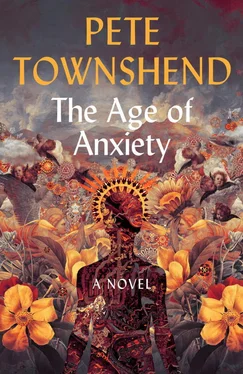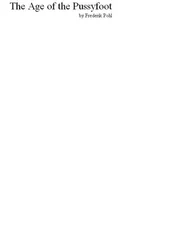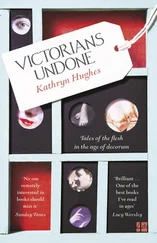“I assumed he meant to some other place: heaven, hell, the astral plane. I don’t really know.”
I had endured my own awful visions as a result of drug withdrawal, but I had never myself experienced anything quite like what Paul Jackson had felt and seen.
Maud took out a small handkerchief and dabbed her eyes.
“I asked him where this flood of human souls were supposed to go, but he said he didn’t know. When I allowed some skepticism to show, he said angrily that he had seen what he had seen, and he could never be the same again. But I believed him.” She turned to me, almost in an appeal.
Maud had stayed in her small room above the noisy bar of the White Horse for several months, sometimes spending a morning climbing to her husband’s little cave. It was really more like a cutting in a hillside protected by a tree. On these occasions she took him various items he told her he needed: maps, a tent, a small shovel, a compass, a knife, pencil and paper, a waterproof jacket, a drinking water bottle a huge supply of small plastic lighters of the kind used by smokers, blankets, and a walker’s backpack. He planned to kill small animals to eat, but she also took him food.
“I sometimes tried to give him money,” she explained. “But he would never accept it.” Perhaps remembering the pain she had felt back then, the impotence and frustration, her face hardened and she suddenly looked older, her lips tight and lined like a smoker’s.
“I thought he might have begged for money from fell walkers he came across on his walks.” At this memory, she smiled again.
“Why did you think that?”
“He sometimes had things in his cave that I knew had not come from me,” she explained. “And in the second week of the second month I gave him a complete collection of Wainwright’s Guides to the Lakeland Fells , and that he did accept. Do you know about Wainwright?”
I nodded my assent. It is often said that it would take a lifetime to cover all the ground that Wainwright himself had explored in order to produce his famous guides to the entire Lake District; it seemed Maud’s husband had dedicated what remained of the rest of his own life to the task.
“From the time I gave him the guidebooks,” she declared, “he became much harder to track down.” Maud explained that her eccentric husband lived like a tramp-cum-hermit very successfully for a number of years on the hillside near Keswick.
“I’d almost given up hope of ever being able to have a normal life with him again.” As Maud spoke of all this her eyes filled with real tears, and I took the opportunity to move to console her, putting my hand on her arm. She dismissed my action, not kindly, with a series of impatient nods, dried her eyes, and continued.
“Of course I called him Paul, his given name, the name of the man I’d married, but he told me firmly that he was now Nikolai Andréevich. He was living out the character he had brought to life in the film. I must—he said—call him Nik. He insisted that one day the world would understand that the revelation he had experienced had come about as a direct result of his work on the film. He said he had become a new man in those last moments of filming.”
“Does he still call himself Nik?”
She nodded. “And I have accepted it. I call him that too.”
“How did you manage? Did you have anyone to help you?” I tried to imagine how she must have felt alone up in Cumbria, trying to keep communication with her husband open, desperately concerned for him.
“Three months after the final scene of the film was shot,” she said, “the completed feature was released with the usual publicity fanfares. It was then I realized that even if it had not been planned by the producers, my husband’s wild adventure, his absence, and the story of his mental condition were going to make useful and controversial publicity material.”
Boyd’s film had been a success. The riddle around the leading actor’s disappearance in the mountains of the Lake District, his visions, and finally his adoption of the elaborated name of the character he had played in the film, all added to the mystique of the project. The PR company spun the story to great effect, but after a successful release the wheel eventually wobbled and stopped, and Paul Jackson was forgotten.
Eventually Maud returned to London and visited her husband less frequently. Sometimes she would drive all the way to Cumbria only to spend several days wandering the fells herself, never coming across him. Finally, she simply sent packages for him to a policeman she had come to trust, and he would march up to Nik’s cave on his day off and leave them under a pile of rocks.
“Old Nik,” said Maud. “Like the name of the devil!”
She was laughing again. Her husband Paul had rechristened himself Nikolai, and the locals and the fell walkers shortened it to the new nickname. He was rarely sighted in the area, but he was seen often enough for Maud to know he was still alive, still holding up his arms to the rising sun at dawn, and again as it set in the evening.
“I wondered,” said Maud, “if he was still seeing the hosts of angels he had spoken about. Were they still ushering legions of lost souls? Was he seeing souls passing on to the next life?”
“The next life?” I couldn’t hide the incredulity from my voice. Whatever each one of us believes, when we speak of such things in the modern world it is unwise to betray too much metaphysical faith.
I found Maud attractive and intriguing, but she seemed oblivious to my interest in her and I’m afraid my patience was really starting to grow thin. Our meeting was overrunning the time I had allowed for it.
“Interesting. But how,” I asked, I feared quite rudely when I looked back later, “how does any of this concern me?”
Maud explained that having lived rough for fifteen years, a few weeks prior to calling me, her husband had walked into the public bar of the White Horse Inn in the Derwentwater valley.
“He announced that he had come down from the mountain for good.”
The first thing Maud knew about her husband’s return to the normal world had been a message that he was in a police cell in Keswick. The local people had become fond of Maud, and by reputation and gossip of Old Nik as well.
“The story was that one afternoon Nik appeared in the doorway of the inn. His hair was long and curling, afire with the light behind him.”
The Lake District in Keswick had been enjoying the quiet part of its season; spring was slow to set in and it should have been cold and rainy. That afternoon was an exception. The bar was populated by a few locals, a number of professional-looking walkers with the usual thick socks tucked into their boots, and a group of rather trendy-looking teenagers surrounding a gaudy, noisy, electronic gambling machine.
“My husband was lucky.” Maud glanced around my living room, her eyes flitting along the carefully hung paintings. She shook her head sadly and turned back to me, looking me in the eye again. “From the point of view of the people in the bar he must have appeared to be a strange old man. But one of a group of young farmers standing around the buzzing and burbling machine had recognized him from his days as a rock star, and as Nik roared that he was thirsty, they bought him a pint—really strong local beer—and he drank it down in a single throw.
“By the time the local policeman arrived to calm him down he was preaching hell and damnation.” Maud laughed. “He hadn’t had a drink for years, and was accusing the young farmers of trying to poison him. He was shouting that he would fly away; fly away back from whence he had come.”
I summoned the memory of insanities of my own for a moment. No doubt, in the ramblings of the freshly repickled alcoholic, Old Nik saw stars, frogs, goblins, and probably fire-breathing devils with pitchforks.
Читать дальше












